Sports
Pride of Relentlessness – Stanford Cardinal
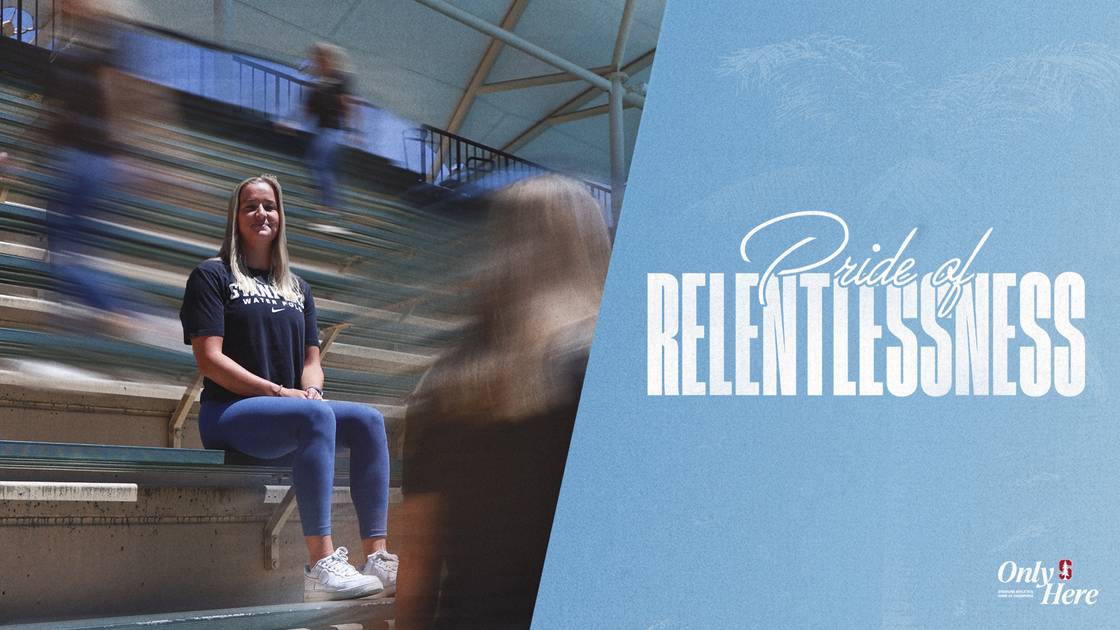
Ryann thinks she gets her humor from Peter. There are flavors of sarcasm and honesty that permeate the Neushul household.
“What I appreciate most about my father is that he tells me what I need to hear, not what I want to hear,” Ryann said. “And to me, that is the biggest kindness you can show a person you love. I don’t want someone around who, when there’s food stuck in your teeth, won’t point it out. The great thing about my dad is he will always tell you — ‘There’s food in your mouth, Sweetie. Just thought you should know.’ Or, in the case of water polo, ‘Yeah, I think you could have done better there. Work on that shot in practice.’”
Cathy is no-nonsense. In parenting and coaching, there are rules to follow. And if there is a rule, it must be followed. Unapologetically strict, Cathy kicked out Ryann out of her share of practices, holding her daughters to the highest of standards.
When Ryann was 13, she told her mom that she was too tired to go to soccer practice.
“OK,” Cathy said. “If we’re going to miss this practice, we’re done with soccer forever.”
“Just one practice?”
“You can’t decide when you want to go to practice. This isn’t optional. If you’re not buying into a team and committed to going, you’re done.”
Cathy doesn’t recall that conversation, but agrees it’s something she would have said. Ryann indeed never played soccer again, and the lesson stuck, though she never would have done the same in water polo, which she enjoyed more anyway. It emphasized the importance of showing up and committing to a team.
“I feel this sense of loyalty and honor to any team I’m on, because of how important my mom stressed that,” Ryann said. “You don’t get a player like myself or my sisters without a mother who’s pushing the importance of it.”
Kiley, a USA Water Polo Hall of Famer, recently was hired to give a personal hour-long training session to a young player. The thought amused her. Kiley never had a private lesson, partly because each day in the pool with her parents and sisters was a personal training session of its own.
When Ryann was nine and Kiley already a 16-year-old star, Kiley took her little sister into the pool and dared Ryann to block her shot. Ryann didn’t have a chance, but Kiley never relented.
“You need to get your block up because I’m going to keep shooting,” Kiley told her.
Shot after shot after shot, these were the types of lessons that can’t be bought.
“When I played against Ryann, I never grabbed her suit,” Kiley said. “I never kicked her. I never punched her. I never had to kick off of her to do something. I would say 95 percent of water polo players need to do that. But against Ryann, I was always like, ‘I will beat you and I will do it the right way.’”
Ryann welcomed these trials, and continues to challenge herself in any way possible.
“This game makes you fight, it makes you find the will,” she said. “Sometimes, it feels like you got hit by a car, and you’ve got to keep playing. You have to dig deep – you have to dig real keep – and that digging deep is what prepares you for the Olympic Games. If you don’t have that hard work, if you don’t have that toughness, then you don’t have anything to draw from.”
On a similar subject, Ryann recalled this story:
“I want to get faster at swimming,” a teammate once asked at practice. “How do I do that?”
Aria Fischer, a former Cardinal who won gold in Rio, mulled the question over and came up with this answer.
“You wake up and you swim,” Fischer said. “And the next day, you wake up and you swim again. And the day after that, you wake up and swim. Day after that … swim. You swim and then you swim and then you swim until you get faster.”
In other words, you can’t do it without the work.
“In water polo, you’re always tired,” Neushul said. “So, if you make decisions while you’re super rested all the time in practice, it may look really beautiful, but then you’re going to get in the game and you know, this Italian woman’s going to be hitting you, and you’re going to have to make a decision.
“That’s what water polo is. It’s being pushed to your physical and mental limit. Every week you’re like, How am I going to get up tomorrow? But you get up. The human body, and your mentality, can do so much more than you think it can.”
Sports
Men’s Basketball Closes Calendar Year at Colgate on Sunday in Non-League Finale
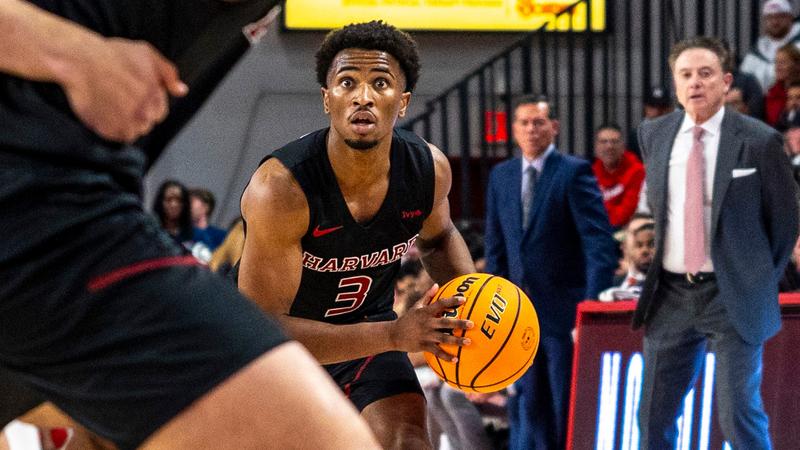
CAMBRIDGE, Mass. – Harvard Men’s Basketball closes the 2025 calendar year at Colgate University on Sunday, Dec. 28 at 2:00 p.m. (ESPN+) at Cotterell Court in Hamilton, New York in the Crimson’s non-league finale.
What to Know
- Harvard features four double-figure scorers on the year in a group that includes sophomore guard Robert Hinton (16.5 points per game), senior guard Chandler Piggé (13.7), sophomore guard Tey Barbour (11.5), and junior forward Thomas Batties II (10.3).
- Among the Crimson’s four double-figure scorers, three of them averaged fewer than 7.0 points per game as first-years. Senior Chandler Piggé (1.9 points per game in 2022-23; 13.7 in 2025-26), junior Thomas Batties II (6.8 points per game in 2023-24; 10.3 in 2025-26), and sophomore Tey Barbour (4.8 points per game in 2024-25; 11.5 in 2025-26) have all increased their production over their careers.
- In the Ivy League rankings, Harvard stands second in free throw percentage (78.5), second in steals per game (7.46), third in scoring defense (68.3), and fourth in field goal percentage (47.0). In the NCAA, the Crimson sits sixth in fewest fouls per game (13.5), ninth in free throw percentage (78.5), and 70th in scoring defense (68.3).
- Sophomore guard Robert Hinton has averaged 16.5 points, 5.2 rebounds, 1.8 assists, and 1.6 steals per game on the year, while shooting 84.5 percent on free throws. Hinton ranks first in the Ivy League in field goals (79), second in steals per game (1.6), third in points (214), third in free throws (49), third in free throw percentage (84.5), sixth in points per game (16.5), and sixth in minutes per game (31.2). On the year, he has scored in double figures 10 times, netted 20 or more points four times, and eclipsed 30 points twice. He earned Ivy League Player of the Week honors on Dec. 8. Hinton – the 2024-25 Ivy League Rookie of the Year – averaged 14.6 points and 4.1 rebounds per game in 2024-25.
- Hinton dropped a career-high 35 points on 12-of-22 field goals and 11-of-12 free throws with eight rebounds at UMass (Dec. 3). Hinton poured in 34 points on 13-of-17 field goals, 4-of-5 3-pointers, and 4-of-4 free throws vs. BU (Nov. 22). He totaled 26 points, five rebounds, and five assists at Furman (Dec. 6) and scored 22 points vs. UNH (Nov. 9). Hinton notched 16 points and seven boards vs. Holy Cross (Dec. 20) and contributed 16 points at Army (Nov. 15). He netted 13 points, including the go-ahead free throws with 5.1 seconds left at Marist (Nov. 16) and added 12 points and nine rebounds at BC (Nov. 26).
- Senior guard Chandler Piggé has posted 13.7 points, 3.6 rebounds, 3.5 assists, and 1.5 steals per game on the year. He ranks fourth in the Ivy League in field goals (70), fourth in assist/turnover ratio (2.2), fourth in steals per game (1.5), fourth in minutes per game (32.4), fifth in assists per game (3.5), seventh in points (178), and ninth in points per game (13.7). He has scored in double figures in 10 games on the year. Piggé – an Honorable Mention All-Ivy selection and CSC Academic All-District honoree last season – notched 13.1 points, 6.7 rebounds, and 2.6 assists per game in 2024-25. He has steadily increased his production over his career, averaging 1.9 points per game in 2022-23, 8.1 points per game in 2023-24, and 13.1 points per game in 2024-25.
- Piggé totaled 23 points and six assists, while shooting 8-of-11 from the floor vs. UNH (Nov. 9). He dropped 21 points with a career-high nine assists at Penn State (Nov. 19). Piggé posted 16 points and seven rebounds vs. Holy Cross (Dec. 20). He registered 14 points against both Army (Nov. 15) and Marist (Nov. 16), connecting on a game-tying 3-pointer with 35.8 seconds left against the Red Foxes. He netted 15 points against both Northeastern (Nov. 11) and Bryant (Nov. 29).
- Sophomore guard Tey Barbour has registered 11.5 points and a team-high 5.5 rebounds per game on the year, while shooting 41.0 percent from 3-point distance. Barbour ranks fourth in the Ivy League in 3-pointers made (32), fifth in 3-pointers per game (2.5), fifth in minutes per game (31.5), and 11th in rebounds per game (5.5). He has scored in double figures in nine games on the year. Barbour notched 4.8 points and 1.8 rebounds per game on the year in 2024-25.
- Barbour scored a career-high 18 points with eight rebounds vs. Holy Cross (Dec. 20), hitting 4-of-5 3-pointers. He posted 15 points and nine rebounds at BC (Nov. 26) after scoring 15 points vs. BU (Nov. 22). He posted 14 points, six rebounds, and a career-high four made 3-pointers vs. UNH (Nov. 9) before netting 12 points on four 3-pointers vs. Northeastern (Nov. 11). He compiled 12 points and seven rebounds at Penn State (Nov. 19). Barbour netted 10 points and hit the game-winning 3-pointer vs. Bryant (Nov. 29).
- Junior forward Thomas Batties II has registered 10.3 points, 3.5 rebounds, and 2.3 assists per game on the year, while shooting 48.5 percent from the field and 52.4 percent from 3-point distance. He ranks fourth in the Ivy League in 3-point percentage (52.4) and sixth in blocks per game (1.0). He has scored in double figures eight times on the year. In 2024-25, Batties II averaged 11.0 points and 5.0 rebounds per game on the year after registering 6.8 points and 4.2 rebounds per game on the 2023-24 season.
- Batties II tallied a season-high 17 points, career-high five made 3-pointers, and a career-high six assists at Penn State (Nov. 19). He scored a game-high 17 points against both MIT (Nov. 7) and Army (Nov. 15). Batties II posted 14 points and a career-high six assists vs. BU (Nov. 22) and notched 13 points at BC (Nov. 26) and vs. UMass (Dec. 3). He totaled 12 points and nine rebounds vs. Bryant (Nov. 29).
- Sophomore guard Austin Hunt has tallied 7.2 points and 3.1 rebounds per game on the year, while shooting 55.1 percent from the field. He ranks sixth in the Ivy League in field goal percentage (55.1). Hunt scored a career-high 19 points on 8-of-9 field goals and 3-of-4 3-pointers vs. Holy Cross (Dec. 20). He notched 13 points, six rebounds, and three assists vs. UNH (Nov. 9) and netted 10 points at Furman (Dec. 6). Hunt averaged 7.8 points and 3.6 rebounds per game in 2024-25.
- Sophomore guard Ben Eisendrath has notched 5.1 points, 3.0 assists, 1.8 rebounds, and 1.6 steals per game on the year, while shooting 51.1 percent from the field. Eisendrath ranks third in the Ivy League in steals per game (1.6) and 10th in assists per game (3.0). He scored a career-high 15 points on 6-of-7 field goals at Penn State (Nov. 19) and netted 10 points at Furman (Dec. 6). Eisendrath distributed a career-high nine assists vs. BU (Nov. 22).
- Harvard and Colgate have met 24 times with the Crimson holding a slight lead in the all-time series, 13-11. The Crimson has won the last eight matchups, including a 78-67 home victory last season.
Next Up
Harvard hosts Dartmouth on Monday, Jan. 5 at 7:00 p.m. (ESPN+) at Lavietes Pavilion in its Ivy League opener.
Sports
Iowa City Liberty grad Shelby Kimm stars as a Division II volleyball All-American
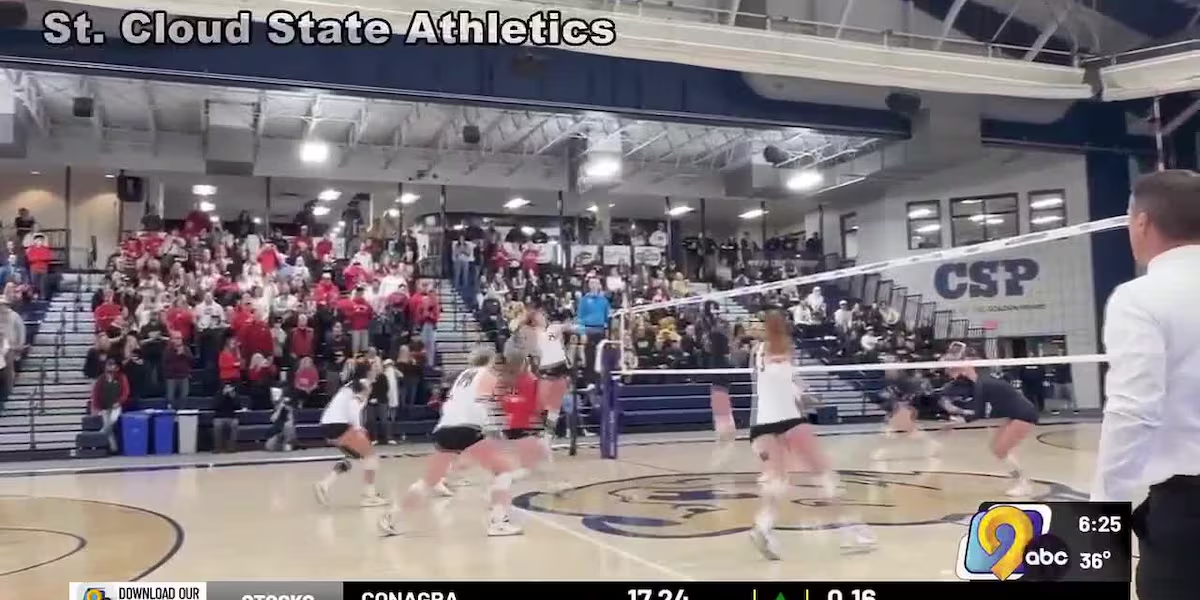
NORTH Liberty, Iowa (KCRG) – A former Iowa high school volleyball star has earned All-American recognition at the college level.
Shelby Kimm, a three-time all-state selection at Iowa City Liberty, was named a Division II All-American this year for St. Cloud State University in Minnesota. The junior led her Husky team this season with nearly 3.4 kills per set.
The Huskies have made it to the round of 16 of the NCAA Tournament each of the past two years, which is tied for the best finish in program history.
After winning a state title at Liberty, Kimm wanted to experience college outside of Iowa.
“We had so many people on our team that were probably their best or one of the best on their high school or club team when you put a lot of those players together it can be a little challenging cause they’re not used to maybe not playing as much,” Kimm said. “You definitely have to work really hard and I think I learned that nothing is guaranteed you have to go into college and work your butt off and hopefully your coaches recognize that and that’s why I try to do.”
Kimm says she’s already excited to get back on the court for her senior season next year.
Three other Iowans are listed on the SCSU roster, including Kimm’s Liberty teammate Asta Hildebrand, Grundy Center alum Carlie Willis and Aplington-Parkersburg alum Kinsey Mohwinkle.
Copyright 2025 KCRG. All rights reserved.
Sports
Men’s Volleyball Picked Second In Preseason AVCA Poll
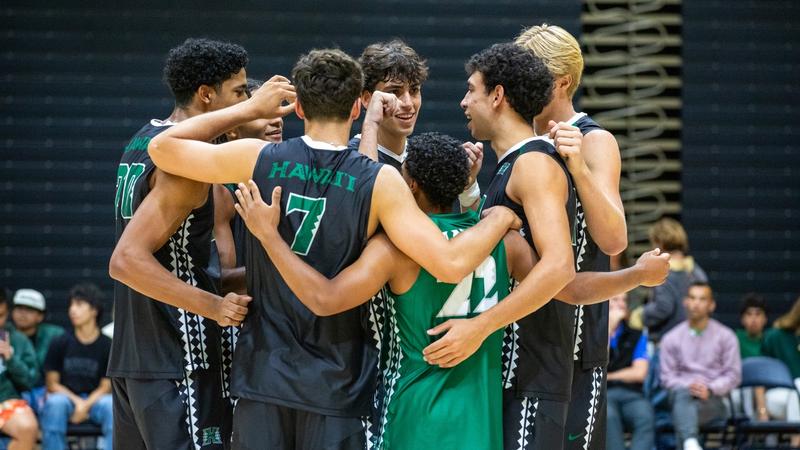
LEXINGTON, Ky. – The University of Hawai’i men’s volleyball team was picked No. 2 in the AVCA preseason poll, marking the eighth consecutive year it earned a top 3 preseason ranking.
The Rainbow Warriors earned seven first place votes and 473 total points, just eight points behind preseason favorite UCLA, who garnered 12 first place votes. Long Beach State was third with five first place votes and 460 points.
UH’s schedule features seven teams ranked in the preseason Top 10 and 11 teams in the Top 20.
Hawai’i finished last season with a No. 3 final AVCA ranking after advancing to the NCAA Championship semifinal round. The No. 3 ranking marked the eighth consecutive year with a Top 5 national finish. The Warriors completed the year with a 27-6 mark and captured their fourth Big West Championship title, defeating eventual national champion Long Beach State in the championship match.
Head coach Charlie Wade, who became the program’s all-time winningest coach last season, is entering his 17th season at the helm with a career record of 319-131.
UH opens the 2026 season with a two-match series against NJIT, Friday, Jan. 2 and Sunday, Jan. 4.
#HawaiiMVB
Sports
Gibbs-Lawhorn Named Raising Cane’s Outstanding Rebel Of The Week
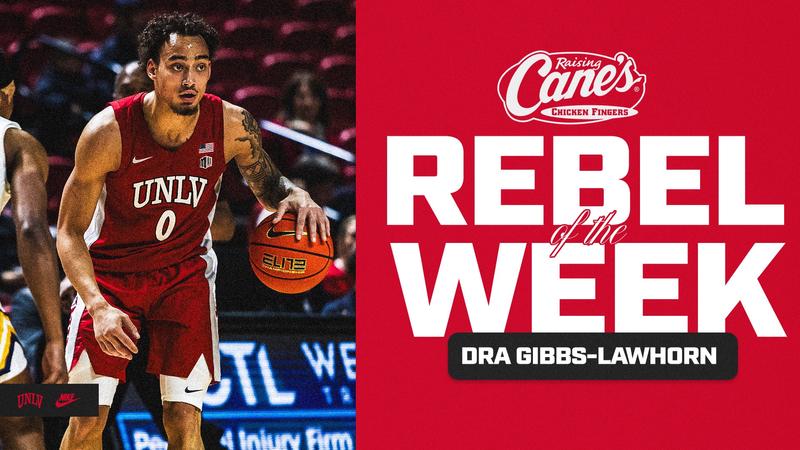
LAS VEGAS (UNLVRebels.com) – UNLV men’s basketball junior Dra Gibbs-Lawhorn has been named the Raising Cane’s Outstanding Rebel of the Week, the school announced Friday.
Gibbs-Lawhorn has earned the recognition for the first time this season, while it’s also the men’s basketball team’s second of the year.
The award goes to the student-athlete who turned in the best individual performance during the previous week of competition from Monday through Sunday as voted on by the UNLV Athletics Strategic Communications department.
A native of Lafayette, Indiana, Gibbs-Lawhorn led the Runnin’ Rebels to a Mountain West opening 84-72 win over Fresno State. He scored a career-high 28 points, while grabbing seven rebounds, four assists, three steals, and a blocked shot.
Additionally, Gibbs-Lawhorn shot 9 of 15 from the field, made all four of his free throw attempts and shot 60% on 3-pointers (6 of 10).
2025-26 Outstanding Rebel of the Week Award Winners
Sept. 3 – Aamaris Brown, Football
Sept. 11 – Jaida Harris, Volleyball
Sept. 16 – Alondra Alarcon, Volleyball
Sept. 23 – Marsel McDuffie, Football
Sept. 30 – Zi Yu Foong, Women’s Golf
Oct. 7 – Kayden McGee, Football
Oct. 14 – Anthony Colandrea, Football
Oct. 22 – Jaida Harris, Volleyball
Oct. 27 – Ilia Snitari, Men’s Tennis
Nov. 5 – Michelle Madrid, Women’s Soccer
Nov. 12 – Jai’Den Thomas, Football
Nov. 12 – Meadow Roland, Women’s Basketball
Nov. 18 – Issac Williamson, Men’s Basketball
Nov. 26 – Ilia Snitari, Men’s Tennis
Dec. 3 – Jai’Den Thomas, Football
Dec. 10 – Bryson Huey, Men’s Swim & Dive
Dec. 26 – Dra Gibbs-Lawhorn, Men’s Basketball
-UNLV-
Sports
Out of indoor eligibility, Texas A&M’s Hellmuth transfers to LSU beach volleyball program
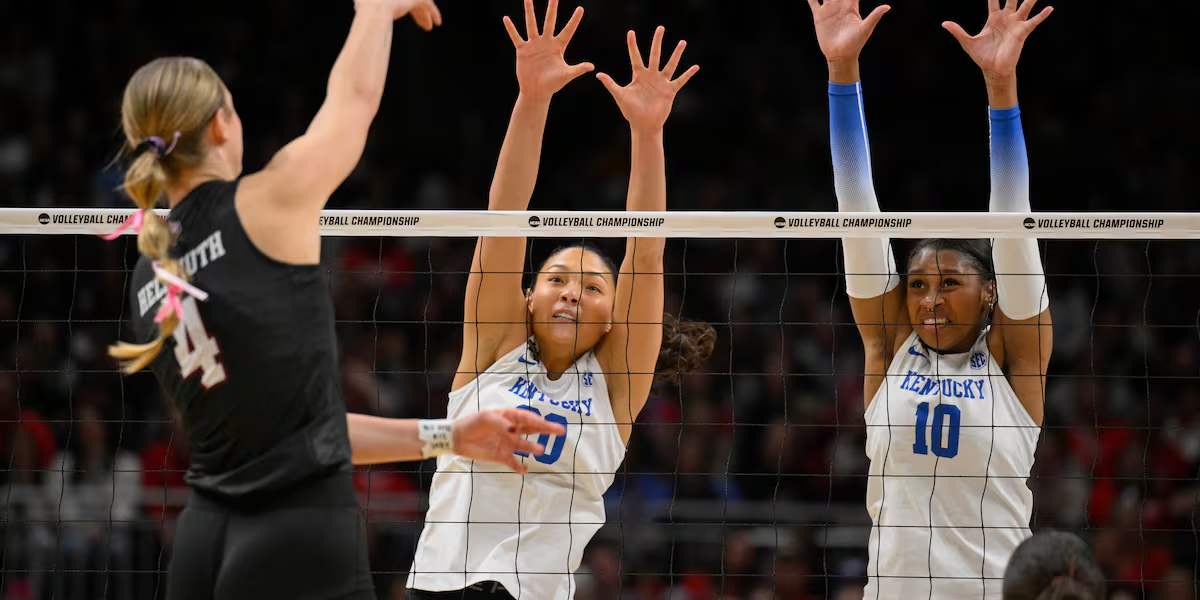
COLLEGE STATION, Texas (KBTX) – Texas A&M outside hitter Emily Hellmuth is transferring to LSU to play with the Tiger beach volleyball program, LSU announced on social media Friday.
Hellmuth could not have returned to defend the national championship with A&M this season, as she is out of eligibility in the indoor game. In switching sports, she will gain a year of eligibility and will be able to play two spring seasons for the Tigers while earning a master’s degree.
Hellmuth finished third on the Aggies in kills (316) and kills per set (2.70) this season as a key piece of A&M’s balanced attack. In 2024, Hellmuth tallied a career-high 330 kills, with a 3 kill average per set. The Highland Park native transferred to A&M after spending her first two seasons at Pepperdine.
The Aggies will need to find a significant number of replacements on the attack, returning only outside hitter Kyndal Stowers in their top 6 attackers from the national championship season.
On Dec. 23, A&M added Marquette outside hitter Natalie Ring and Ohio State middle blocker Kaia Ring through the transfer portal, according to releases and social media posts by the program. Friday, A&M announced the addition of Boise State middle blocker Eliza Sharp.
Ring paced the Golden Eagles with 497 kills and a 4.6 kill per set average, while hitting. 274. Castle recorded 200 kills, with seven double-digit kill matches, and 91 blocks last season.
“We value speed at the middle blocker position and it’s rare to see someone with Kaia’s length who can move the way she does,” A&M head coach Jamie Morrison said in a statement. “Beyond the physical tools, she is an incredible human. I truly enjoyed every part of the recruiting process with Kaia and can’t wait to have her here in Aggieland.”
Sharp was the Mountain West Conference freshman of the year after ranking second on the Broncos’ in kills with 250, averaging 2.21 per set. She hit at a .323 clip and tallied 140 blocks.
“It’s hard to win conference awards as a middle blocker and Eliza comes to us as the reigning Freshman of the Year in her conference,” Morrison said in a statement. “She is an elite athlete as both a blocker and an attacker who will continue the lineage of great middle blockers at Texas A&M. From our first phone call, I knew she would be a great fit for our culture, not just as a player, but as a person who embodies the values of Texas A&M.”
Copyright 2025 KBTX. All rights reserved.
Sports
A&M Volleyball’s Lednicky signs professional contract with LOVB Houston | KWKT

BRYAN-COLLEGE STATION, Texas (FOX 44) – Texas A&M Volleyball’s Logan Lednicky has signed her first professional contract with League One Volleyball (LOVB) Houston, the organization announced Friday.
Texas A&M Athletics says Lednicky joins the Houston based LOVB team after spearheading the Aggies to the program’s first national title. The opposite hitter etched her name in Texas A&M history, as she broke the program rally-scoring record for career kills concluding her four years with 1,686.
The Sugar Land, Texas, native developed a well-rounded game throughout her four years but offensively is where she excelled. She recorded double-digit kills in 94 matches during her career, including 23 straight to conclude the 2025 campaign which led to a national crown.
Texas A&M Athletics says Lednicky showed her versatility during her time in Aggieland, racking up 379 blocks which ranks 11th in program history and secured back-to-back 100-block seasons in her junior and senior campaigns. She also tacked on 808 digs which helped account for 28 career double-doubles.
Lednicky cemented herself as an all-time great for the program and received a pair of AVCA Second Team All-America honors, was a four-time All-SEC and All-Region selection, AVCA Player of the Year Semifinalist, NCAA Tournament Team recipient, NCAA Regional Most Outstanding Player and five-time SEC weekly award winner.
Texas A&M Athletics says yhe pin hitter got her international career started this past summer, as she received her first senior-national team call up for the United States and was named to the Volleyball Nation’s League roster for the opening two weeks in Brazil and Serbia. She competed in seven of the eight matches over the two weeks, tallying 43 points on 38 kills and five blocks, while adding 26 digs.
-

 Motorsports2 weeks ago
Motorsports2 weeks agoSoundGear Named Entitlement Sponsor of Spears CARS Tour Southwest Opener
-

 Motorsports3 weeks ago
Motorsports3 weeks agoDonny Schatz finds new home for 2026, inks full-time deal with CJB Motorsports – InForum
-
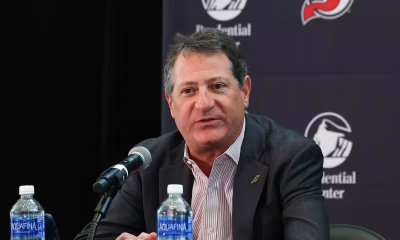
 Rec Sports3 weeks ago
Rec Sports3 weeks agoDavid Blitzer, Harris Blitzer Sports & Entertainment
-
Sports3 weeks ago
Elliot and Thuotte Highlight Men’s Indoor Track and Field Season Opener
-

 Motorsports3 weeks ago
Motorsports3 weeks agoRick Ware Racing switching to Chevrolet for 2026
-

 NIL3 weeks ago
NIL3 weeks agoColleges ponying up in support of football coaches, programs
-
Sports3 weeks ago
West Fargo volleyball coach Kelsey Titus resigns after four seasons – InForum
-

 Sports2 weeks ago
Sports2 weeks ago#11 Volleyball Practices, Then Meets Media Prior to #2 Kentucky Match
-

 NIL2 weeks ago
NIL2 weeks agoDeSantis Talks College Football, Calls for Reforms to NIL and Transfer Portal · The Floridian
-

 Technology3 weeks ago
Technology3 weeks agoWearable Gaming Accessories Market Growth Outlook
































